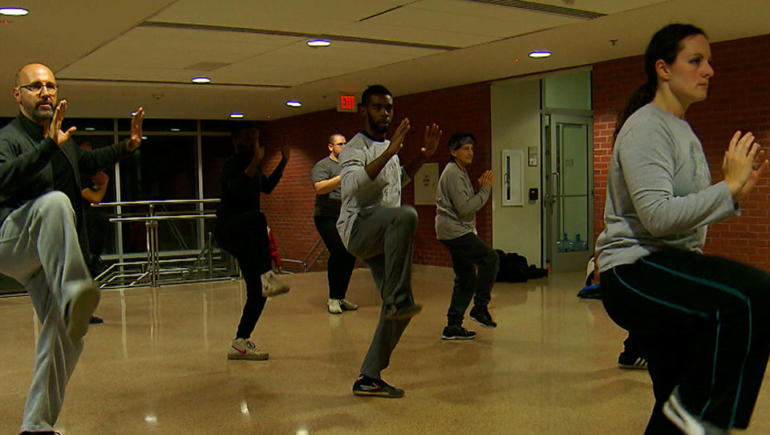This week people around the world mark World Cancer Day.
Much progress has been made on research and to improve treatments. Now, there’s more evidence that a traditional Chinese martial art holds promise in helping patients.
CGTN’s Frances Kuo explains.
The movements are graceful and fluid – a perfect marriage between the mind and body.
Nick Gracenin teaches tai chi, an ancient Chinese martial art involving deep breathing and slow, methodical movements.
He says this “meditation in motion” offers many health benefits like helping with balance, flexibility, circulation and relaxation.
“It’s really a unique mixture, being quietly active and calm but intent,” said Gracenin.
And in some classes, Gracenin noticed something else.
“Three people that I’ve worked with as an instructor who were breast cancer patients all got some relief, and one of them actually attributes her remission to doing tai chi and qigong,” said Gracenin.
According to the World Health Organization, breast cancer is the most common cancer among women worldwide. Last year, 627,000 died from the disease.
The rate among women in China is increasing twice as fast as the global rate.
Tai chi and other traditional Chinese exercises were cited in recent U.S. reports showing benefits to patients with breast cancer in particular.
Dr. Karen Mustian is a lead investigator of meditative movement at the University of Rochester Medical Center in the state of New York.
“I was so moved by tai chi and mindfulness movements that I quit my job and went back to school to get my PhD to do this work on cancer patients,” said Mustian.
For nearly 20 years, she’s been studying the effects of tai chi on breast cancer patients.
Mustian discovered that tai chi significantly improved their quality of life, health and lung functions, muscle strength and bone health.
“I’m very interested in trying to unpack exactly what it is that makes that magic happen when you put it all together,” said Mustian.
Part of that “magic,” said Mustian, is that tai chi helps counteract the body’s natural inflammatory response when it’s subjected to harsh cancer treatments like radiation and chemotherapy.
“When you interject something like tai chi into that, the response that manages the inflammation that comes from the disease and treatments is bolstered, such that the body can actually create an anti-inflammatory response to return the body to a normal functioning state.”
She says more research is needed to help determine how much tai chi is effective.
But for Mustian and tai chi proponents, the chance to improve the lives of cancer patients is encouraging.
“You start to really own what’s happening,” said Gracenin. “Not that you own the disease but you own your body.”
Junfeng Zhang discusses cancer trends in China
CGTN’s Asieh Namdar talks with Professor Junfeng Zhang of Duke University about cancer trends in China.
 CGTN America
CGTN America

